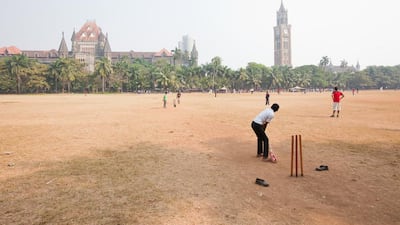"'Cricket, cricket, cricket,'" intones a character in Aravind Adiga's fourth novel, Selection Day, "'it's just a big circus, anyway.'" Needless to say, this is a book about cricket and its circus-like status in Adiga's native India: a showy, thrilling, family-friendly event, but also a specialist, elitist enterprise that caters for the privileged and leaves those without talent or means on the sidelines.
As with most sports-centred novels, the sport here becomes a tool for exploring wider issues and upshots. Deploying a rich, vibrant cast from various walks of life, Adiga shows how cricket unites and divides, excites and empowers, and how its shadier, behind-the-scenes elements mirror and encapsulate the corruption and injustice endemic to Indian society.
Adiga’s young hero is 14-year-old Manjunath Kumar, who, according to his school coach, is the biggest secret in Mumbai cricket. At the outset, though, it is his older brother Radha who exhibits greater potential. Both share a one-room brick shed with their dirt-poor, chutney-selling father.
Mohan Kumar believes he has sired the world’s best and second-best batsmen and does all he can to push his sons forward. A lucrative cricketing contract will result in international renown and a one-way ticket out of their slum.
Manju is soon in contact with movers, shakers and admirers. We meet straight-talking journalist and talent scout Tommy Sir, who wants to find tomorrow’s new cricketing star “more than he wants a glass of water on a hot day”. There is investor Anand Mehta, whose money-making scheme involves a sponsorship programme that gives Manju his first taste of hard cash. Rich-girl Sofia turns out to be the boys’ number-one fan, while Muslim youth Javed emerges as Radha’s rival and ends up as Manju’s mentor.
The novel charts a rags-to-relative-riches trajectory. After years of living in his brother’s shadow – “He has a secret contract with God, and I do not” – Manju breaks Radha’s record for the highest score in Mumbai school cricket.
Success enables the family to move up and out, and allows Manju to go abroad to England to mix with “Britishers” and “learn on their classical green lawns the subtle secrets of cricket and come back to India a super sensation”.
But these bright horizons are frequently overcast. Adiga throws in bouts of sibling enmity and spells of adolescent angst – particularly when Manju finds himself caught "between his two desires". He puzzles over the mystery of his absent mother, worries that he prefers science and CSI Las Vegas to cricket, and contemplates following Javed's lead by abandoning the sport altogether and following an entirely new path determined by his own needs and impulses.
In recent years, two standout novels have utilised cricket to original effect. Shehan Karunatilaka's Chinaman, a rambunctious adventure about a missing cricketer, shone a light on modern-day Sri Lanka; Joseph O'Neill's Netherland, a stunning human drama built around cricket in New York, illuminated the post-9/11 immigrant experience.
Selection Day has more in common with the former than the latter – charged with feverish energy, imbued with vivid colour, and possessing an equivalent cricket page-time – but comes with more graspable, identifiable characters whose actions and fates move us.
But there are also laughs to be had. Mohan is a wonderful tragicomic creation, an overbearing parent who, when not braying about being “the Progenitor of Prodigies” or “the father of champions” is bullying his offspring and banning them from hormone-damaging pursuits such as shaving, girlfriends and learning to drive.
Mehta’s riotous disquisitions offer skewed insight into the Indian character: “We want to see ourselves depicted as soulful, sensitive, profound, valorous, wounded, tolerant and funny beings. All that Jhumpa Lahiri stuff,” he notes.
In actual fact, “We are animals of the jungle, who will eat our neighbour’s children in five minutes, and our own in ten.”
Not every reader will relish the – albeit condensed – descriptions of cricket play. However, it is hard to fault how impassioned Adiga’s characters are about the game, from the enthusiasts who laud it as “the triumph of civilisation over instinct” to the detractors who label it a “fraud”: “Nothing that stops for lunch can be called a sport.”
Selection Day lacks the satirical bite and societal sweep of Adiga's 2008 Booker Prize-winning debut, The White Tiger. It makes up for it, though, with comic gusto, tense predicaments and heart-warming relationships. Life may be a sticky wicket for Manju, but for his creator this is another great delivery.
Malcolm Forbes is a freelance writer based in Edinburgh.

